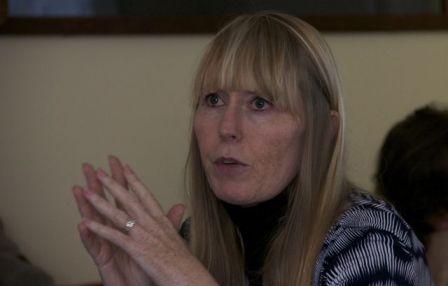
Taking stock of the media since the onset of democracy, Prof Jane Duncan of the School of Journalism and Media Studies critiqued the established systems of news in South Africa, examining specifically, the coverage of Marikana -- one of the media’s most glaring failures.
Her talk entitled: “The Role of Media in Contemporary South African Struggles”, emphasised the media’s responsibility to be a vigilant champion of marginalised voices.
In a sample study that looked at over one-hundred news sources during the week the Marikana incident unfolded, Prof Duncan found a distressing tendency toward citing only official sources and business perspectives. This coverage showed a near total omission of the miners’ perspectives, pointing to journalists’ failure to investigate the most basic of questions: ‘What happened at Marikana?’.
“[The biased coverage] helped to give credence to the perspective of the police,” she said, who maintained that the effective silencing of the miners perpetuated the dominant narrative that they were solely to blame. Prof Duncan suggested that rather than being an isolated incident, Marikana represents “a pattern of inadequate coverage of South Africa’s democracy.”
But this kind of failure to promote and uphold the rights of ordinary citizens is not exclusive to the media. She gave examples of the government’s own bureaucratic systems that inhibit democratic rights such as to assemble in public, or the freedom of speech. She cited the bureaucratic criteria required by the Rustenburg Municipality for a legal march, which includes paying for a police presence.
The media crisis is also a result of fundamental structural problems that have made it into a commodity. “Truly non-commercial media barely exists,” said Prof Duncan, mentioning the migration from an analogue to a digital media system as yet another example of how news and media is becoming a resource for the elite.
The shift will also result in a narrowing of community media programming from an already limited twenty percent, down to a meagre four percent. “This fosters a society unable to see itself,” she said, adding that it also creates the sort of “distorted picture” that was projected in the coverage of Marikana.
In order to address failures to democratise the media, not only is more funding and support needed for community media, but a greater commitment to those who are marginalised and lack the tools they need to be heard in the public sphere, said Prof Duncan. Regardless of the challenge we face, she was adamant: “It’s important to believe in the capacity to change society,” she said, “Another media system is possible.”
Though Media Studies Associate Professor, Lynette Steenveld largely agreed with Prof Duncan’s criticisms of the media, she pointed to the problematic relationship between the state and the media as an important factor inhibiting its ability to deliver.
Prof Steenveld also drew a distinction between structural and professional delivery, and questioned the use of the media as a scapegoat when, in fact, the capital-driven system in which it operates is the problem. She cautioned against simplistic conclusions, suggesting that a deeper investigation of societal values is necessary. “Media transformation is not sustainable without social transformation,” she said.
Photo and story by Hailey Gaunt
